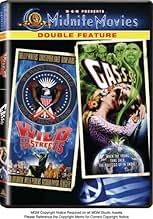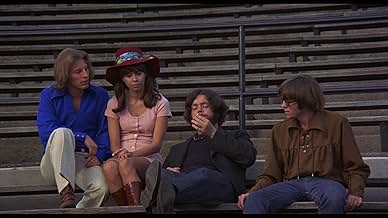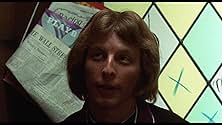IMDb रेटिंग
4.2/10
1.8 हज़ार
आपकी रेटिंग
अपनी भाषा में प्लॉट जोड़ेंA gas is let loose upon the world that kills anyone over 25 years old.A gas is let loose upon the world that kills anyone over 25 years old.A gas is let loose upon the world that kills anyone over 25 years old.
Talia Shire
- Coralee
- (as Tally Coppola)
Alan H. Braunstein
- Dr. Drake
- (as Alan Braunstein)
Michael D. Castle
- Burroughs
- (as Mike Castle)
Raye Birk
- Mort Catafalque
- (as Ray Birk)
फ़ीचर्ड समीक्षाएं
This is the film that Roger Corman says was his final straw with AIP. After mildly editing WILD ANGELS and THE TRIP, their virtual elimination of "God" and the obliteration of the original ending led him to form New World Pictures.
Seeing this film at the American Cinemateque in a striking new print shows both its virtues as a one-of-a-kind (well, at least for anybody BUT Corman!) oddity as well as a failed attempt at counter-culture comedy. It's hard to see how even the original Director's Cut (if it exists at all) would really be that much of an improvement. What is on the screen is still probably about 90% of what Corman shot, and it's a scattershot affair. The Cinematography and Music stand out, as well as bits of the acting, particularly by Elaine Giftos.
Roger Corman spoke after the Cinemateque screening.
Corman said that he hadn't seen the movie since its release in 1970. It was edited before its theatrical release by AIP. Most significantly was the almost complete elimination of the voice of "God". Corman speculated that since AIP had gone public (stock market) around that time, that they were concerned that the "Jewish comic"-type voice would be considered sacriligious! Then, AIP cut the most elaborate shot in the entire film. The original ending! Elaine Giftos and Robert Corff were to "walk off into the sunset in the most cliched ending possible." This was shot in a big panaroma shot "with marching bands and the whole cast included." Corman said that it STILL bothers him that as released, the film "has no ending."
Seeing this film at the American Cinemateque in a striking new print shows both its virtues as a one-of-a-kind (well, at least for anybody BUT Corman!) oddity as well as a failed attempt at counter-culture comedy. It's hard to see how even the original Director's Cut (if it exists at all) would really be that much of an improvement. What is on the screen is still probably about 90% of what Corman shot, and it's a scattershot affair. The Cinematography and Music stand out, as well as bits of the acting, particularly by Elaine Giftos.
Roger Corman spoke after the Cinemateque screening.
Corman said that he hadn't seen the movie since its release in 1970. It was edited before its theatrical release by AIP. Most significantly was the almost complete elimination of the voice of "God". Corman speculated that since AIP had gone public (stock market) around that time, that they were concerned that the "Jewish comic"-type voice would be considered sacriligious! Then, AIP cut the most elaborate shot in the entire film. The original ending! Elaine Giftos and Robert Corff were to "walk off into the sunset in the most cliched ending possible." This was shot in a big panaroma shot "with marching bands and the whole cast included." Corman said that it STILL bothers him that as released, the film "has no ending."
Impossible to say how Roger Corman's attempt at a loose kaleidoscopic comedy-satire in the Richard Lester vein would have turned out had not American International Pictures re-edited it against his wishes. He left the studio after 15 years with them after this.
The script is decidedly weak, a common Corman failing, full of potentially intriguing, half-formed ideas that are never realised. Meanwhile the cast of unknowns never get any real chance to build up their characters into anything sympathetic or likable. It's as if the director isn't really interested in them.
It's an adequately stylish, and zippy enough production. But like much of Corman's later stuff for AIP, it also has an air of opportunism about it, riding the post-Easy Rider youth-counterculture boom while having only an outsider's empathy with it (Corman was 44 when he made this).
Still, if nothing else he does get a chance to say an ironic farewell to Edgar Allan Poe (the author of Corman's earlier celebrated cult film series), who here appears in period dress riding a Harley Davidson with a stuffed raven on his shoulder!
The script is decidedly weak, a common Corman failing, full of potentially intriguing, half-formed ideas that are never realised. Meanwhile the cast of unknowns never get any real chance to build up their characters into anything sympathetic or likable. It's as if the director isn't really interested in them.
It's an adequately stylish, and zippy enough production. But like much of Corman's later stuff for AIP, it also has an air of opportunism about it, riding the post-Easy Rider youth-counterculture boom while having only an outsider's empathy with it (Corman was 44 when he made this).
Still, if nothing else he does get a chance to say an ironic farewell to Edgar Allan Poe (the author of Corman's earlier celebrated cult film series), who here appears in period dress riding a Harley Davidson with a stuffed raven on his shoulder!
This was a weird sort of science fiction comedy from "Professor Corman". This film pretty much reminds me of a spaced out version of the short lived show "The New People", which came out a year earlier. The whole idea of everyone over 35 being killed by a gas that didn't work on the younger population was a wild idea to begin with, but the surrealism of this movie even made it wilder to look at. Too bad that Corman's last film for A.I.P. couldn't have been a schlock classic like many of his earlier. At least on the bright side we get to look at a very young Cindy Williams, Talia Shire and Ben Vereen in what was one of, if not their first roles in a motion picture.
Roger Corman is undeniably one of the most versatile and unpredictable directors/producers in history. He was single-handedly responsible for some of my favorite horror films ever (like the Edgar Allen Poe adaptations "Masque of the Red Death" and "Pit and the Pendulum") as well as some insufferably cheap and tacky rubbish quickies (like "Creature from the Haunted Sea" and "She Gods of the Shark Reef"). Corman also made a couple of movies that are simply unclassifiable and – simply put – nearly impossible to judge properly. "The Trip", for example, as well as this imaginatively titled "Gas-s-s-s" can somewhat be labeled as psychedelic exploitation. In other words, they're incredibly strange hippie-culture influenced movies. Half of the time you haven't got the slightest idea what's going on, who these characters are that walk back and forth through the screen and where the hell this whole thing is going. The plot is simply and yet highly effective: a strange but deadly nerve gas is accidentally unleashed and promptly annihilates that the entire world population over the age of 25. This *could* be the basic premise of an atmospheric, gritty and nail-bitingly suspenseful post-apocalyptic Sci-Fi landmark, but writer George Armitage and Roger Corman decided to turn it into a "trippy" road-movie comedy. None of the characters is even trying to prevent their inevitable upcoming deaths; they just party out in the streets and found little juvenile crime syndicates. "Gas-s-s-s" is a disappointingly boring and tries overly hard to be bizarre. The entire script appears to be improvised at the spot and not at all funny. Definitely not my cup of tea, but the film does have a loyal fan base and many admirers, so who am I to say that it's not worth your time or money?
Roger Corman's Gas-s-s-s, his final film as director for AIP, is dated (and probably even was for the period it got released), but somehow it's almost part of its charm. It's an irreverent comedy about a noxious gas that wipes out everybody- at least in the US much as we can figure- who's over the age of 25. Party-time! In what appears to be, in the premise, as a slight twist on Corman's own Last Woman on Earth, it's an epic of low-budget proportions, a rampant fiasco of kids in hippie-wear (or not as case turns out) and the Darwinian struggles that take place as the roughnecks, jocks and bikers-on-country-clubs face off against those darn 'commie-anarchists'. Certainly a good premise indeed, at least for those who love the exploitation fare of the period (myself counted, even as I'm from after that era).
While it might be one of Corman's (intentionally) funnier pictures, there's a nagging feeling that something's not totally there. It is cheap, it is slapdash, it's episodic. The problem, as with some of Corman's other movies, is that a little more effort would make something even more interesting. If there was, for example, another snappy and sharp writer alongside George Armitage, who could whip the script into a tight and awesome shape, it could even be one of the great exploitation films. As it stands, it's merely OK overall. Luckily the good tries to outweigh the bad, which is that there are some really, actually clever one-liners ("Hey, we all have our own inconsistencies, that doesn't stop the revolution," to "Drop that chloride, you commie anarchist!") and seeing the biker country-clubbers and the God lightning bolt climax.
Best of all is to see a running-gag in-joke for Corman- probably more than one, actually. The first is more obvious, and laugh-out-loud, which is a biker Edgar Allen Poe, who just shows up here and there like some sage wise-man (who is, of course, not over 25) with his wife and occasional raven on his shoulder spouting garbled quotes. The second is a little more subtle, which seems to be a play on his film the Trip, as in the psychedelic-type scenes (i.e. dancing to Country Joe and the Fish) with the camera zooming in and out fast, lots of hand-held, etc). Corman's gone through this all before, so it has to be questioned: how much of this is tongue in cheek, and how much is just almost shoddy film-making? Can't be sure. At least there was consistent chuckling to be had, especially at seeing a young Bud Cort in a cowboy hat, and, of all people, Talia Shire!
While it might be one of Corman's (intentionally) funnier pictures, there's a nagging feeling that something's not totally there. It is cheap, it is slapdash, it's episodic. The problem, as with some of Corman's other movies, is that a little more effort would make something even more interesting. If there was, for example, another snappy and sharp writer alongside George Armitage, who could whip the script into a tight and awesome shape, it could even be one of the great exploitation films. As it stands, it's merely OK overall. Luckily the good tries to outweigh the bad, which is that there are some really, actually clever one-liners ("Hey, we all have our own inconsistencies, that doesn't stop the revolution," to "Drop that chloride, you commie anarchist!") and seeing the biker country-clubbers and the God lightning bolt climax.
Best of all is to see a running-gag in-joke for Corman- probably more than one, actually. The first is more obvious, and laugh-out-loud, which is a biker Edgar Allen Poe, who just shows up here and there like some sage wise-man (who is, of course, not over 25) with his wife and occasional raven on his shoulder spouting garbled quotes. The second is a little more subtle, which seems to be a play on his film the Trip, as in the psychedelic-type scenes (i.e. dancing to Country Joe and the Fish) with the camera zooming in and out fast, lots of hand-held, etc). Corman's gone through this all before, so it has to be questioned: how much of this is tongue in cheek, and how much is just almost shoddy film-making? Can't be sure. At least there was consistent chuckling to be had, especially at seeing a young Bud Cort in a cowboy hat, and, of all people, Talia Shire!
क्या आपको पता है
- ट्रिवियाThe film's subtitle comes from an alleged statement of a U.S. Army Major (name unknown) during the Vietnam War who was said to have defended the complete and total destruction of both a Vietnamese town and everyone and everything in it at the hands of Army soldiers who were acting on his orders by supposedly saying "It became necessary to destroy the town to save it."
- गूफ़After breaking through a roadblock, the main character's car has three out of its four front headlights broken as a result. Later, all four of them are suddenly intact when it does not seem probable that the three broken ones could have been repaired that quickly.
- भाव
Dr. Murder: Are you now, or have you ever been, a member of any organization which advocates the violent overthrow of the government of the United States of America?
Marissa: Yes.
Dr. Murder: Which one?
Marissa: The Paul Revere and the Raiders Fan Club.
- साउंडट्रैकVictory March
(University of Notre Dame fight song)
[played by a marching band]
टॉप पसंद
रेटिंग देने के लिए साइन-इन करें और वैयक्तिकृत सुझावों के लिए वॉचलिस्ट करें
विवरण
इस पेज में योगदान दें
किसी बदलाव का सुझाव दें या अनुपलब्ध कॉन्टेंट जोड़ें



























